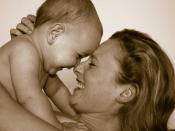Attachment and Brain Development
Attachment is a bond to a specific person that brings happiness, security, fulfillment, support, and nurture. "Simply stated, bonding is the process of forming an attachment. Just as bonding is the term used when gluing one object to another, bonding is using our "emotional glue" to become connected to another. Bonding, therefore, involves a set of behaviors that will help lead to an emotional connection (attachment)." (Perry) It is crucial that attachment and bonding occur within the earliest years of life. An accepting, caring, supportive, responsive parent can create a bond with their child that can be one of the most positive impacts in both of their lives. Children who are emotionally secure and attached to their parents develop mentally, emotionally, and physically well, and usually become well rounded individuals.
Children who are maltreated (neglected and/or abused) often delay slowly in development. They have a tendency to be emotionally unstable, disturbed, stressed, and act purely on survival instincts.
"The most common effect is that maltreated children are, essentially, rejected. Children who are rejected by their parents will have a host of problems including difficulty developing emotional intimacy." (Perry) These children must be handled with care because the development of attachment and bonds during their early life were inexistent. It is sometimes necessary to just identify and spend time with a maltreated child. This will help the child to begin to open up, and develop healthy relationships with people. It is a slow process that can be emotionally and physically draining for both the child and adult.
If I were to have a child I would take steps to make sure that an attachment bond was formed in the earliest stage of life: infancy. Caring for the child is not enough; holding, rocking, hugging, singing, and loving...


